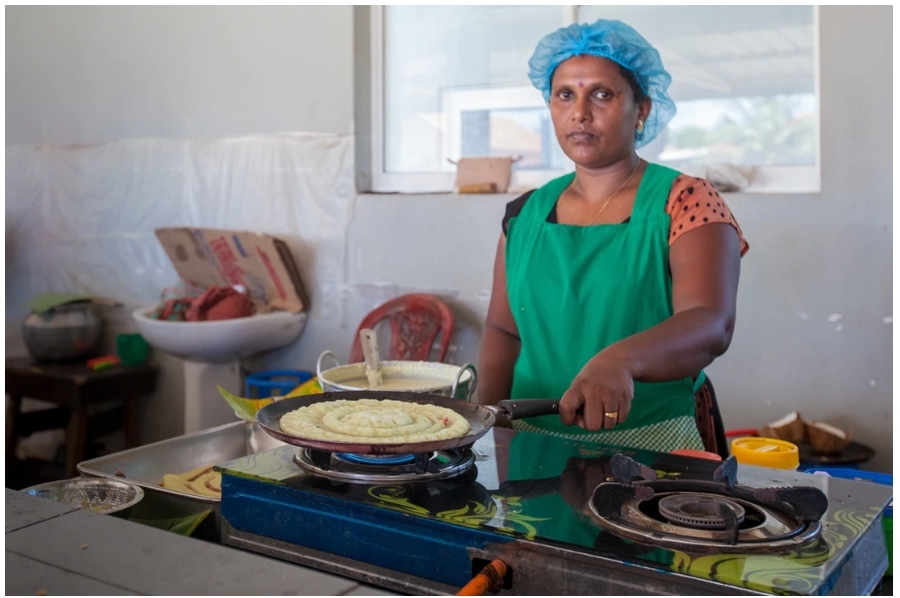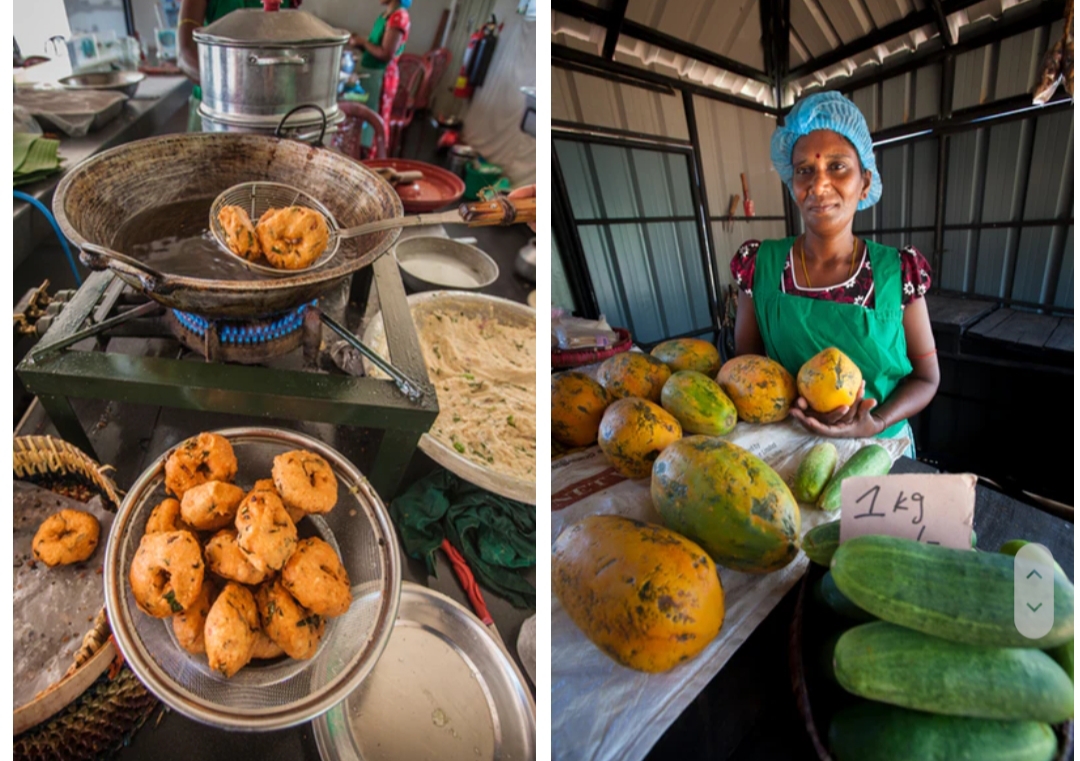Food from the Heart Ladies who survived the conflict in Mullativu are now cooking up a storm with traditional nutritious food

It’s nearly lunchtime in Mullaitivu in north-eastern Sri Lanka. Behind the counter of the local Ammachchi, Nagulaswaran Radidevi is turning out gundu dosas – fat and fluffy – to feed the crowd. She covers the warm stack with a banana leaf, as she deftly plates up the dosas with a spoonful of aromatic sambar, and spicy coconut sambol on the side. The president of the Mullai Women Agricultural Extension Society, Radidevi and her team took over responsibility for this outlet in 2016. She has been an employee ever since.
She is one of 18 women working at the outlet. The name Ammachchi – meaning ‘grandmother’ in Tamil – is a promise that the menu will deliver homely, tasty food. Radidevi and the other women offer over twenty items for very reasonable prices. In fact pittu, the most expensive item on the menu, costs just Rs.70. The women are kept busy as a result.
All the women working here are survivors. Radidevi herself was displaced four times during Sri Lanka’s nearly 30-year long conflict. An errant shell took her finger, and left her with a wound in her stomach. She recalls how, after having spent time in a camp for the internally displaced, she and her family returned home to the nearby village of Mulliyawalai – only to find they would have to start over from scratch.
“When we came, we didn’t even have a house,” she says now. “We had come from such a desperate place, but our situation here was so bleak that we now wondered if we could go back.”
It didn’t help that women working is generally frowned upon in Radidevi’s community.

“If a family can afford it, they will keep their women at home,” says A. Judicia Aruna, the manager of Ammachchi in Mullaitivu. This is particularly true of women who are widows, who have injured partners or are the sole breadwinners for their households.
The social disapproval can be so powerful that women will try to find work in places where they won’t run into their neighbours: “People from the same village don’t come here to work,” says Judicia. “Women from Mulliyawalai come and work in Mullaitivu, while women from Mullaitivu work in Mulliyawalai.”
However, the Ammachchis (which have branches in Vavuniya and Killinochchi) are so popular that Radidevi says that she gets instant respect when she tells people she works there. Even local government officials treat it as a favourite lunch spot. In Mullaitivu, the outlet is actually on the premises of the Department of Agriculture who were also responsible for building the food court at a cost of Rs.6.4million.

The Ammachchi was selected for inclusion in the United Nations Development Programme’s (UNDP) Agro Economic Development Project which is funded by the government of Canada. An infusion of Rs.3.56mn helped the cooperative procure kitchen utensils, cooking and instant food preparation facilities as well as restaurant furniture. UNDP funding also paid for a new washroom facility and a sales outlet for organic fruits and vegetables. The state continues to support the initiative by monitoring quality and providing technical and financial guidance.
BROADENING HORIZONS
Radidevi says she was one of 14 women who were taken to visit similar initiatives like Hela Bojan at Gannaruwa. The exposure proved invaluable – she learned new recipes and cooking methods and was also taught basic business skills, with food quality, food presentation and hygiene training being conducted with the support of the Provincial Health Department.
Ponniah Atputhachandran, the deputy provincial director of agriculture says he eats at Ammachchi more often than not. “The food is served hot, you can see it made in front of you, it’s high in nutrition and prepared hygienically,” he says.
POPULAR SPOT IN TOWN
The outlets have certainly grown in popularity. As of January 2018, monthly turnover at the Mullaitivu branch alone increased by nearly four-fold to Rs.1million. Currently, around 8 farmers are linked with the sales unit, and have invested in growing chemical-free fruit and vegetables.
As a result, the Mullai Women Agricultural Extension Society has gone from strength to strength. Judicia says she can see the women prospering before her eyes: “They are able to manage their finances – they don’t need as many loans and can pay back the ones they take because of the reliable income. Women who used to come to work by bus, now come on their bikes.”

For his part, Ponniah believes the women are providing a valuable service. “With more and more Sri Lankans being diagnosed with non-communicable diseases, the objective with Ammachi was to promote traditional, healthy foods. Through this we are changing attitudes.”
Mullaitivu, Sri Lanka
(Article by UNDP Sri Lanka)